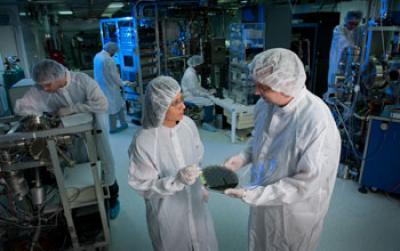The National Science Foundation (NSF), in keeping with the United State Government’s National Nanotechnology Initiative, has awarded a US $55.5 million grant to university consortia for setting up three Engineering Research Centers (ERCs).
 ASSIST Center Director Dr. Veena Misra (center left) and Deputy Director Dr. John Muth (center right) are pictured in the Nanostructures Laboratory at North Carolina State University (Credit: Marc Hall, North Carolina State University)
ASSIST Center Director Dr. Veena Misra (center left) and Deputy Director Dr. John Muth (center right) are pictured in the Nanostructures Laboratory at North Carolina State University (Credit: Marc Hall, North Carolina State University)
The new ERCs will promote multidisciplinary nanoscience education and research in collaboration with industrial entities. In the course of the next five years, the Nanosystems ERC or NERCs will function to enhance knowledge and pioneer innovations that resolve major issues plaguing society like human health and nanotechnology’s impact on the environment. The research areas of focus for the three NERCs will be mobile computing, nanomanufacturing, electromagnetic systems, environmental and health sensing.
According to Thomas Peterson, assistant director for engineering at NSF, the comprehension of nanoscale behavior has reached a point, which allows for significant advances to be made in devices, materials and manufacturing at the nano level. He said that the NERCs will have their premise in the successful research endeavors in fundamental nanoscience research over the last ten years. The three NERCs belong to the third generation of ERCs launched by NSF and they are expected to establish revolutionary engineering and science platforms for their corresponding area of research, innovation and education in nanosystems.
The University of Texas at Austin will lead the NSF Nanosystems Engineering Research Center for Nanomanufacturing Systems for Mobile Computing and Mobile Energy Technologies (NASCENT) for turning out flexible and reliable nanomanufacturing processes with high throughput for mobile nanodevices. North Carolina State University will lead the NSF Nanosystems Engineering Research Center for Advanced Self-Powered Systems of Integrated Sensors and Technology (ASSIST) to develop self-powered wearable systems to observe a person’s health and environment simultaneously in order to determine the relation between chronic diseases and pollutants present in the environment. The University of California Los Angeles will lead the NSF Nanosystems Engineering Research Center for Translational Applications of Nanoscale Multiferroic Systems (TANMS) to improve the systems functioning by employing electromagnetic fields.